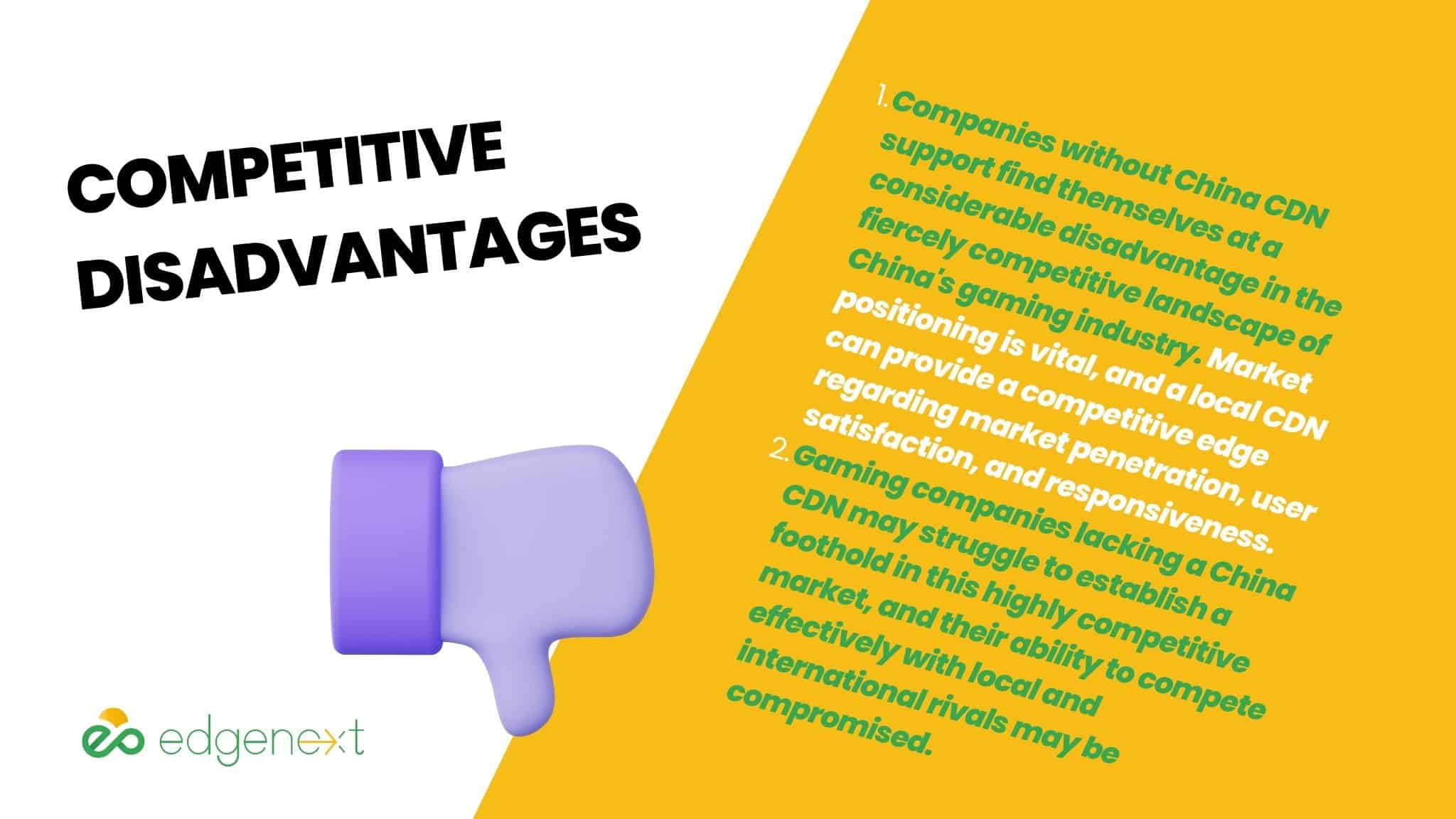
Gaming companies operating in China without a local Content Delivery Network (CDN) face several significant challenges. Key issues include slower game load times and latency, negatively impacting the gaming experience in a market where speed is crucial. Navigating the Great Firewall presents another major hurdle: it can restrict access to game servers and content. Additionally, companies must deal with China’s stringent data localization and security laws, which are difficult to comply with without a local CDN. These challenges can lead to inconsistent performance across different regions in China, putting companies at a competitive disadvantage. Without the benefits of a China CDN, gaming companies may struggle to meet the high expectations of Chinese gamers and maintain a strong market presence.
The global gaming industry thrives, and few markets shine as brightly as China. With a massive player base and a hunger for interactive and immersive gaming experiences, China’s gaming landscape presents a world of opportunities. However, challenges abound for gaming companies looking to operate in this dynamic market, especially when venturing without a China Content Delivery Network (CDN) support. In this comprehensive exploration, we delve
into the multifaceted world of gaming in China, highlighting the hurdles gaming companies face and the pivotal role CDNs play in overcoming these obstacles.
One must grasp its sheer size and scope to understand the significance of China’s gaming market. China boasts the world’s largest gaming population, with millions of dedicated gamers spanning diverse demographics. It’s a market where gaming is not merely a pastime but a way of life. Gamers here are discerning, with high expectations for immersive gameplay, stunning graphics, and seamless online experiences.
The diversity of gaming preferences in China is also striking. While mobile gaming is dominant, PC and console gaming continue to thrive. Understanding this eclectic mix of gaming platforms is essential for companies seeking success in China.
China’s vast geographic expanse presents gaming companies with formidable connectivity and speed challenges. Maintaining fast and reliable internet connections is no small task in a country of such magnitude. The demands of real-time and multiplayer gaming experiences further exacerbate this issue. The frustration of gamers facing slow load times and lag can lead to player attrition and revenue loss.
Gamers today expect seamless and uninterrupted gameplay, regardless of their location within China. However, achieving this level of connectivity consistency across the nation without the support of a China Content Delivery Network (CDN) remains a significant hurdle.
The Great Firewall of China stands as a substantial obstacle for gaming companies venturing into the market without the assistance of a China CDN. This intricate internet censorship system can block or drastically slow down gaming content from foreign servers. The ramifications of restricted access are far-reaching, affecting the potential player base and the overall market reach of games.
China’s regulatory landscape is renowned for its stringent policies, and gaming companies that operate without a local CDN must navigate a complex web of compliance requirements. Understanding and adhering to Chinese internet and gaming regulations are non-negotiable. Companies that fail to meet these requirements risk the suspension of their operations, fines, or even legal actions.
The regulatory hurdles in China can be multifaceted, ranging from content restrictions to licensing requirements. Gaming companies must invest time and resources in ensuring compliance while seeking to balance regulatory obligations with their business goals.
Data localization laws in China mandate that companies store and process sensitive data, including player information, within the country’s borders. This poses significant data security challenges for gaming companies without a local CDN. Storing critical data offshore can raise concerns about data breaches and privacy violations.
Ensuring the security of player data is paramount for maintaining player trust and regulatory compliance. Gaming companies must explore alternative methods for safeguarding data, such as encryption and secure data centers, to mitigate the risks associated with offshore storage.
Consistency in gaming performance is a critical factor for player satisfaction and retention. Like anywhere else, gamers in China expect a seamless and enjoyable experience. However, achieving consistent performance across the country’s vast and diverse geographic regions is no small feat for gaming companies lacking the support of a CDN.
Inconsistent gaming experiences, characterized by lags, slow load times, or server instability, can lead to player frustration and attrition. Maintaining performance consistency requires careful optimization and strategic content delivery.

Companies without China CDN support find themselves at a considerable disadvantage in the fiercely competitive landscape of China’s gaming industry. Market positioning is vital, and a local CDN can provide a competitive edge regarding market penetration, user satisfaction, and responsiveness.
Gaming companies lacking a China CDN may struggle to establish a foothold in this highly competitive market, and their ability to compete effectively with local and international rivals may be compromised.
While the challenges of operating in China’s gaming industry without a China CDN are significant, they are not insurmountable. Gaming companies can adopt various strategies and best practices to navigate these hurdles successfully.
One approach is establishing strategic partnerships with local service providers to improve connectivity and address regulatory complexities. Leveraging technology solutions to optimize game performance and content delivery can help maintain player satisfaction. Furthermore, engaging with the local gaming community and gaining insights into player preferences can inform content adaptation and marketing strategies.
In the ever-evolving gaming world, China stands as a tantalizing frontier with unparalleled potential. Its vast market size, diverse player base, and insatiable appetite for immersive gaming experiences make it a coveted destination for gaming companies worldwide. However, the path to success in this dynamic arena has formidable challenges.
Connectivity issues, the Great Firewall of China, regulatory hurdles, data localization and security concerns, performance consistency, and competitive disadvantages pose significant obstacles to gaming companies operating without a China Content Delivery Network (CDN). These challenges, while daunting, are not insurmountable.
Don’t let hurdles hold you back. Elevate your gaming experience in China with Edgenext. Contact us today to explore how our CDN solutions can transform your presence in this dynamic gaming landscape. Success awaits, and Edgenext is here to help you achieve it.
References:
· Encyclopaedia Britannica. Great Firewall of China. https://www.britannica.com/topic/Great-Firewall
· IBM. Content Delivery Networks (CDN). https://www.ibm.com/topics/content-delivery-networks
· Batchelor, J. (2023). China’s games market reached $45.5 billion in 2022. GamesIndustry.biz. https://www.gamesindustry.biz/chinas-games-market-reached-455bn-in-2022
· EdgeNext.Comparing Local vs International CDN Providers for Content Delivery in China. Retrieved from https://www.edgenext.com/comparing-local-vs-international-cdn-providers-for-content-delivery-in-china/ · EdgeNext. China CDN. https://www.edgenext.com/china_cdn/

© 2025 EdgeNext Copyright All Right Reserved